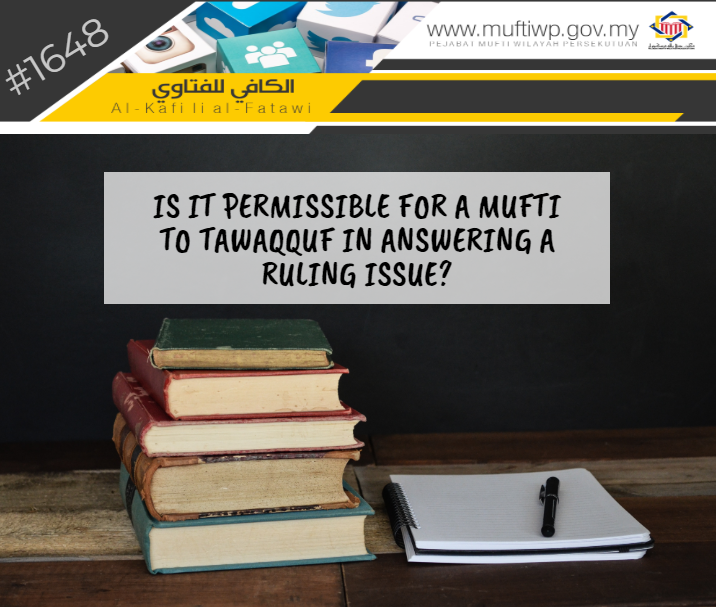Question:
Assalamualaikum wbt. Is it permissible for a mufti to refuse to answer an issue regarding a ruling of certain matters asked to him?
Answer:
Waalaikumussalam wrt, wbt.,
Alhamdulillah, praise and thanks to Allah for the countless blessings He has blessed us all with. Blessings and salutations to the Prophet Muhammad PBUH, his wives, his family, companions and all those that follow his teachings to the day of judgement.
Answering and explaining a ruling for a certain issue presented is said as issuing a fatwa and the individual responsible for this is the mufti. In truth, issuing a fatwa for a certain matter is a great and heavy responsibility for it involves the rulings of God for every issue that is happening.
Fatwa is a heavy matter according to syarak. Due to this, we can see how the salafussoleh are very careful in answering every matter asked to them. Among the evidences that are used in this issue is a hadith narrated by ‘Ubaidullah Ibn Abi Ja’far RA, he said, the Prophet PBUH said:
أَجْرَؤُكُمْ عَلَى الْفُتْيَا، أَجْرَؤُكُمْ عَلَى النَّارِ
“Those who are bravest among you in issuing a fatwa are the bravest among you to enter hellfire.”
Narrated by al-Darimi (159)
The above hadith clearly shows the warning against those who issue a fatwa without ahliyyah (qualifications). Also, for those who issue a fatwa without accurate knowledge.
Coming back to the question presented, generally, we would like to state that answering a question for those who have the knowledge to do so is a fardhu for them. While keeping quiet or staying silent for those who do not have knowledge is also a commandment in Islam. This is according to two of the statements of Allah SWT:
قَالَ يَا آدَمُ أَنبِئْهُم بِأَسْمَائِهِمْ
He said, "O Adam, inform them of their names."
Surah al-Baqarah (33)
Allah SWT also states:
قَالُوا سُبْحَانَكَ لَا عِلْمَ لَنَا إِلَّا مَا عَلَّمْتَنَا إِنَّكَ أَنتَ الْعَلِيمُ الْحَكِيمُ
They said, "Exalted are You; we have no knowledge except what You have taught us. Indeed, it is You who is the Knowing, the Wise."
Surah al-Baqarah (32)
In the issue of tawaqquf which is stopping oneself from answering a question asked, then it is an example of previous scholars. Among the reasons they chose to tawaqquf are:
- There is no clear evidence on certain issues. The reason is, there seem to be contradictory evidences according to a mufti. For example, in the issue of the ruling of eating sea pig or its scientific name, Imam Malik chose to tawaqquf in this issue for there is evidence on the permissibility of eating animals of the sea. Whereas there is another evidence on the prohibition of eating pigs. Thus, Imam Malik did not issue a ruling on this matter.
- Second, the mufti cannot decide on the ruling of the issue. As we know, the knowledge of a mufti is limited and does not encompass every issue. Thus, surely, there are situations where he is unable to issue an answer on a certain issue of which he is unclear about the whole matter. This situation showcases the warak attribute of a mufti.
Conclusion
To conclude, we would like to state that basically, it is an obligation for a mufti to answer all and any question that is within his knowledge and capacity to answer. The reason is, neglecting to answer an issue of which he knows the answer to is included as hiding knowledge which is prohibited by the Prophet PBUH. This is according to a hadith narrated by Abu Hurairah RA, where he said the Prophet PBUH said:
مَنْ سُئِلَ عَنْ عِلْمٍ يَعْلَمُهُ فَكَتَمَهُ أُلْجِمَ يَوْمَ الْقِيَامَةِ بِلِجَامٍ مِنْ نَارٍ
“He who is asked something he knows and conceals it will have a bridle of fire put on him on the Day of Resurrection.”
Sunan Ibn Majah (266)
The same is stated in an Islamic legal maxim:
تأخير البيان عن وقت الحاجة لا يجوز
“Delaying in giving explanation in the time of which it is needed is impermissible.”
However, if the mufti does not know the accurate answer for a certain issue, whether because it is a fairly new matter that calls for more analysis and research or the matter is unclear to the mufti because there are different evidences on the matter, then it is permissible for a mufti to tawaqquf in giving an answer on the issue.
Other reasons for this have been discussed in our previous article Al-Kafi #155 which can be accessed through the link https://bit.ly/2IkObB9
Lastly, we pray to Allah SWT to give us the right understanding in religion. Amin.


